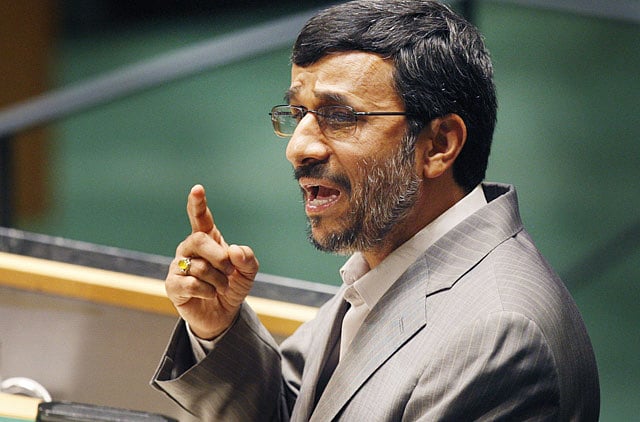Few people expect much out of the new round of talks on Iran's nuclear programme, scheduled to be held later this month. The last time such negotiations took place, in October 2009, there was a degree of optimism, and suspense.
Tehran had already agreed on a package of proposals with Brazil and Turkey on exchange of low-enriched uranium (LEU) for nuclear fuel, and that was hoped to form a solid basis for a deal. But this time around, the two sides have only agreed to talk, as no one wishes to be blamed for possible failure of the negotiations. Simultaneously, however, the parties are digging in their heels. The United States and its western allies have reportedly set high standards, nearly doubling the amount of LEU demanded of Iran in exchange for fuel for its nuclear plants. The Islamic Republic, too, has hardened its defiance. President Mahmoud Ahmadinejad is already going around delivering vitriolic speeches, bragging in his familiar boxer style; and even more moderate officials like Foreign Minister Manouchehr Mottaki claim that Iran has no need to swap its LEU and can enrich it to higher levels itself.
These could of course be pre-negotiation bluffs, but they also underscore Ahmadinejad's determination not to appear soft on such a strategic issue — both in and outside Iran. Despite his sinking popularity (even among fellow conservatives), the president enjoys full support on the nuclear subject within the regime, and some hardliners even prod him to be tougher. So any leniency on his part would seriously tarnish his image and perhaps compromise his position within the conservative establishment. It was actually his extreme stance on the nuclear issue that catapulted Ahmadinejad to power and he is aware that an about-face could cost him his job.
No sign of a breakthrough
So, as things stand, the parties might be in for a long, protracted haggling with no chances of a breakthrough in sight. Western powers are still counting on the success of sanctions, but there are no real signs yet that Iran is buckling under economic pressure. Sanctions are effective to a point when it comes to a country like Iran, and the country might have already passed that stage. The experience of the past three decades has shown that the Islamic republic can weather any outside pressure as long as it does not cripple its oil exports, and the US and allies have a long way to go before they reach that point. Iran's economy is minimally integrated into the global system and not quite vulnerable to conventional methods of punishment. Ever since the 1979 Islamic Revolution, the country has grappled with one crisis after another — war, sanctions, internal strife, etcetera — and the regime has emerged from all unscathed, relying on an effective military and police force and an efficient system of charity to contain popular anger. This time around, too, Ahmadinejad's government is already bracing for the worst, lifting subsidies on basic goods and instead creating a safety net of cash to benefit the "disinherited", which constitutes his main popular support base. This, together with a militarised state and conservative backing, will help the president to ride high. It will give him enough control to risk a new round of international sanctions, or even more, by refusing to budge in the nuclear talks.
Time on his side
Ahmadinejad has little to lose by holding fast. He sees no imminent threat of military action, with the US and its allies bogged down in Afghanistan and still engaged in Iraq. On the contrary, the stalemate in talks gives him time to pursue his aims — whether it is to develop a bomb or, as he says, secure recognition of his country's nuclear rights. The other side, however, does not have much time on its hands, amid fears that Iran is moving quickly towards nuclear weapon capability. Some Israeli intelligence officials claim Tehran might already be in possession of a few bombs. True or not, they add urgency to the debate, and the harsh rhetoric coming out of Iran is not helping it either. Sooner or later the US and its western allies may come to the conclusion that sanctions are doomed to fail. Some US politicians are already calling for war and this trend might gather pace with Republicans' Congressional victory this month. For now, President Barack Obama is expected to resist calls to turn the page on Iran and continue to insist on a diplomatic solution. But things may change with his declining popularity over the economy and as he gears for re-election in about two years.
Mehrdad Balali is a journalist and writer living in California. His novel Houri was recently published in New York.
Sign up for the Daily Briefing
Get the latest news and updates straight to your inbox
Network Links
GN StoreDownload our app
© Al Nisr Publishing LLC 2025. All rights reserved.
